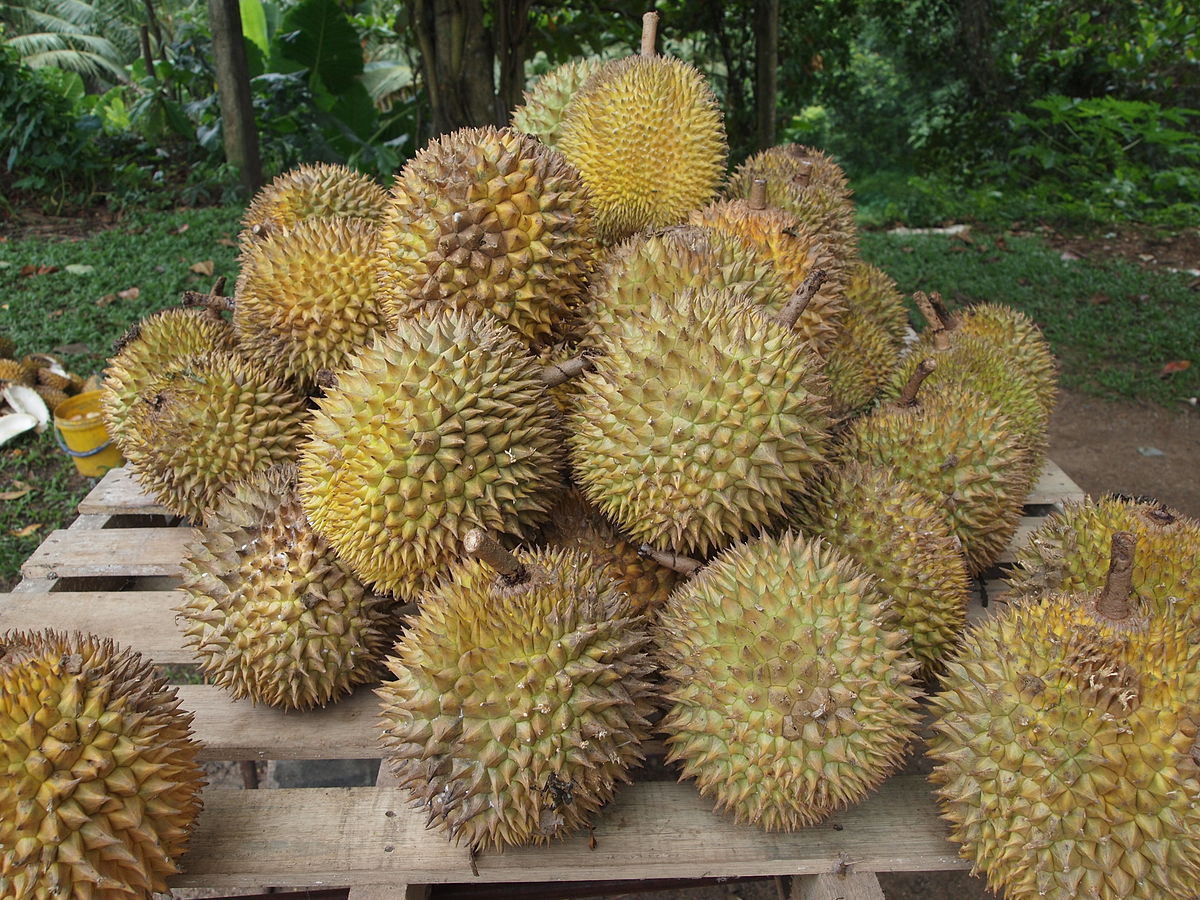
If you have ever traversed the busy streets of popular cities in Malaysia, Indonesia or Thailand, especially on a sweltering summer afternoon, chances are you have stopped at a local café to savour durian ice cream. Not only to gain some respite from the heat, but also to satisfy your curiosity over this supremely healthy, yet rather infamous exotic fruit.
While the luscious dessert prepared from durian is quite appetizing, as are the crispy wafers, honied candies and spicy curries infused with its essence, the same can’t be said about the fruit itself. And no, this is not because of its taste, which is actually intensely rich, uniquely bitter-sweet and delicious, but more due to its characteristic strong smell.
Table of Contents
Durian – The King Of Fruits:
Yes, an unpleasant scent resembling musty environs emanates from the durian fruit, before cutting it open to reveal the juicy, thick and nutrient-dense pulp.
While the flavour and nourishment it provides have earned durian the title of “King Of Fruits” in South-East Asian nations, its foul odour has prompted travel bans, making it a notorious celebrity of sorts in the world of natural bounty.
Moreover, people hailing from regions where this fruit is originally grown, as well as adventurous tourists who have dared to take a bite of durian, are divided over opinions about its smelly quality. Agreed, that most individuals are unable to tolerate the overpowering aroma of durian, but then there are a few who really find it alluring, comparing it with that of turpentine, although they are a minority.
Nutrition Facts Of Durian – A Superfood In Every Way:
Love it or hate it, one thing that remains a solid truth is the impressive nutritional profile of durian fruit, which is overflowing with incentives for both physical and mental wellbeing.
Durian fruits are enormous in size, bearing an oval shape with a hard, spiky exterior. The succulent edible flesh within houses several big seeds and has a bright white to yellow colour. Native to tropical countries in South-East Asia, namely Malaysia, Indonesia, Thailand, Singapore and the Borneo Islands, there are more than 30 varieties of this pungent fruit, with the most commonly available strain scientifically known as Durio zibethinus.
Blessed with a plethora of fortifying components, durians contain vast amounts of calories, simple sugars or carbs, besides saturated fats, which immensely boost energy, stamina and assist in weight gain. It is also a powerhouse of proteins, unsaturated lipids and dietary fibers, for proper growth, development and digestive processes.
The treasure trove of vitamins B1, B2, B3, B6, C, A, E and minerals calcium, magnesium, phosphorous, manganese, potassium, sodium, iron, zinc, copper work in synergy, to regulate metabolism, strengthen bones, muscles, enhance brain functions, bolster immunity and promote eyesight.
Furthermore, a wealth of antioxidants are present in durian fruit, such as flavonoids – hesperidin, quercetin, rutin, myricetin, luteolin, phenolic acids – cinnamic acid, gallic acid, vanillic acid and carotenoids – lutein, zeaxanthin, tannin, lycopene, beta-carotene. These efficiently eliminate toxins and free radicals from the system, to aid in remedying a host of illnesses.
Thanks to these myriad wholesome elements, durian is indeed a superfruit, that is endorsed for countless health reasons.
The Pros Of Durian Fruit – Its Health Benefits And Therapeutic Uses:
- Noteworthy concentrations of fibers and proteins in this fruit, coupled with a low GI (Glycemic Index) control sudden spikes in blood sugar levels and keep diabetes in check
- Consisting of ample volumes of vitamin B6, also called pyridoxine, this revolting-perfumed produce uplifts mood, relieves stress, improves memory and stimulates nervous system activity
- Profuse quantities of potassium in durian maintain optimal blood pressure, prevent clogging of arteries and avert cardiac ailments like atherosclerosis, arrhythmia etc.
- Abundant in potent antioxidants, this food lowers the risk of acquiring cancer, chronic disorders and even slows disease progression in some instances
- Not only the interior portion but even the outer peel/rind of this bounty, as well as the leaves, roots, are utilised extensively in traditional medicine, to cure jaundice, skin infections and fevers
The Cons Of Durian Fruit – Its Drawbacks And Reported Side Effects:

- Very expensive fruit, as it involves difficult cultivation techniques and highly enriched soil, apart from incurring significant shipping costs
- Banned in many airports, hotels and public places, due to durian’s disagreeable fragrance caused by volatile sulphur-containing amino acid compounds like ethanethiol and methionine gamma lyases
- Triggers nausea, vomiting and upset stomach in many, stemming from the harvest’s repulsive smell similar to that of rotten onions
- Harmful when eaten along with alcohol, as the food interferes with ethanol breakdown in the body, giving rise to heart complications
- Contraindications surface when this organic produce is ingested with diabetes or hypertension medications, worsening these conditions
Conclusion:
Heaped with infinite augmenting constituents and essential nutrients, the pros of durian fruit for complete wellness obviously outweigh its cons. Endure the dominating stench while cutting it open and enjoy this delightful fruit just as is. Or better still, incorporate it into mouth-watering puddings and zesty gravies, to reap the numerous advantages it confers, for total healthcare.








